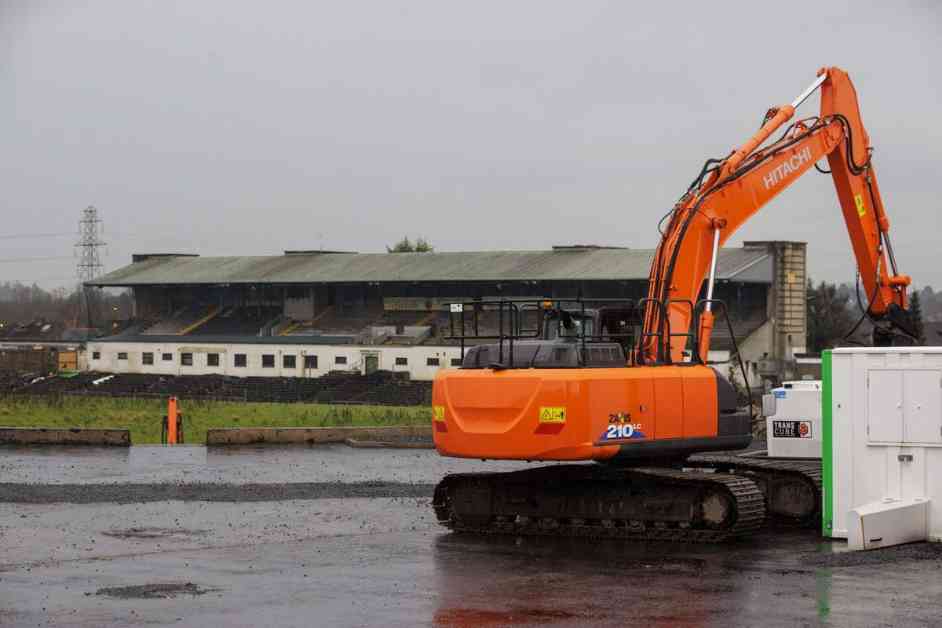The UK Government has announced that it will not be funding the redevelopment of Casement Park in time for the Euro 2028 football tournament. This decision comes as a significant blow to the hopes of many who were looking forward to the revitalization of the derelict west Belfast GAA ground.
Delays and Funding Gap
First Minister Michelle O’Neill expressed her disappointment at the news, calling it a missed opportunity for both sport and the economy. The redevelopment of Casement Park was set to be a key part of the Euro 2028 event, with the stadium earmarked to host five matches. However, delays and escalating costs have created a funding gap that has proven to be insurmountable at this time.
The estimated cost of building Casement Park has risen significantly, from £180 million when the bid for Euro 2028 was awarded in October 2023 to potentially over £400 million. This sharp increase in costs has made it difficult for the UK Government to justify providing funding for the project. Additionally, there are concerns that the stadium would not be completed in time for the tournament, as required by Uefa regulations.
Impact on the Community
The decision to not fund the redevelopment of Casement Park has had a profound impact on the local community and the wider sporting community in Northern Ireland. The Ulster GAA, as well as the Irish Football Association and other sporting bodies, have expressed their disappointment at the news. The loss of the opportunity to host matches at Euro 2028 represents a setback for the region and a missed chance to showcase its sporting talent on the global stage.
It is clear that the decision to not fund the redevelopment of Casement Park has broader implications beyond just the sporting arena. The economic benefits that would have come from hosting Euro 2028, such as job creation and increased tourism, will now be lost. This missed opportunity is a blow to the region’s economy and a setback for its development.
Government Response
In response to the decision, First Minister Michelle O’Neill has vowed to continue working towards the redevelopment of Casement Park. She emphasized the commitment of the Executive and the British and Irish governments to seeing the project through to completion. Despite the setback, O’Neill remains determined to deliver state-of-the-art facilities and a first-class stadium for Gaelic games.
The UK Government has cited concerns about the escalating costs and the risk of not completing the stadium in time for Euro 2028 as the primary reasons for withholding funding. This decision was not taken lightly, but it was deemed necessary given the circumstances. The government remains committed to working with partners and Uefa to ensure that the tournament has a positive impact on the UK as a whole.
In light of this decision, there will be ongoing discussions with stakeholders, including the GAA, to determine the best way forward for Casement Park. It is important to consider the views of all parties involved and find a solution that benefits the community and supports the development of sport in Northern Ireland.
Political Fallout
The decision to not fund the redevelopment of Casement Park has sparked political controversy and criticism. Shadow Northern Ireland minister Paul Holmes has accused Prime Minister Keir Starmer of making detrimental choices that will impact the people of Northern Ireland. The Labour Government’s decision to withhold funding for city and growth deals, as well as Casement Park, has been met with criticism and concern.
The impact of these decisions on the region’s economy and development cannot be understated. The loss of funding for key projects like Casement Park and the city and growth deals will have far-reaching consequences for Northern Ireland. It is crucial for the government to reassess its priorities and ensure that the region receives the necessary support for its growth and prosperity.
In conclusion, the decision to not fund the redevelopment of Casement Park for Euro 2028 is a significant setback for Northern Ireland. The loss of this opportunity represents a blow to the region’s economy, sports community, and overall development. Moving forward, it is essential for all stakeholders to come together to find a solution that benefits the community and ensures the legacy of sport in Northern Ireland.












